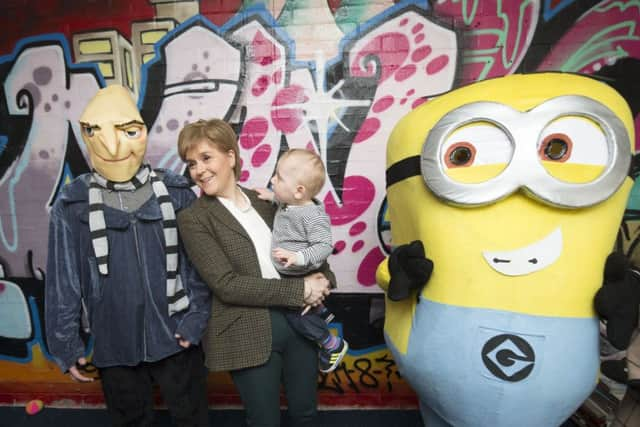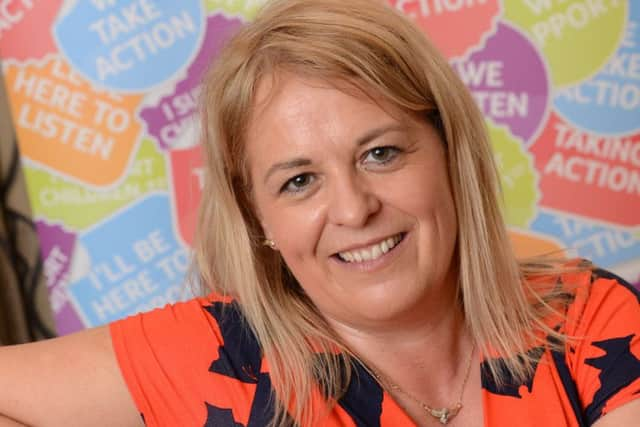Revealed: what can happen when a Named Person reports on your children


The handwritten note on an official form read: “Mr Smith feels it is impossible to stop his youngest son from sucking his thumb as he needs it for comfort. Did not appear to take advice on board fully.”
The words, written by the two-year-old thumbsucker’s Named Person, sent a shiver down the spine of Andrew Smith [not his real name], a father-of-two young boys and a respected academic at one of Scotland’s leading universities.
Advertisement
Hide AdAdvertisement
Hide AdContained within a 60-page document that had been compiled about his family, the note referred to a blister which had appeared on the toddler’s thumb as a result of the childhood habit. It also suggested Smith contact his GP if the blister became “hot to touch or very red”.


Smith, whose name has been withheld to protect the identities of his children, grew more alarmed as he leafed through the document, the vast majority of which had been redacted.
The surviving extracts appeared to indicate that the minutiae of his family life had been recorded in painstaking detail for almost two years, under a Named Person scheme which has been introduced in his part of the country ahead of its final roll-out across all of Scotland in August. A separate note made by the Named Person charged with keeping an eye on the academic’s two little boys was concerned with nappy rash.
“Suggests infrequent changes of soiled nappy though difficult to assess this,” the Named Person – a health visitor – jotted down.
For Smith, the contentious scheme was redolent of a Big Brother-style snoopers’ charter. Also of concern was the tone of the notes.


“I felt shocked and vulnerable,” he told Scotland on Sunday. “Then I felt angry and powerless when I saw these notes made of very trivial things and constant surveillance of small things that are part of everyday parenting – a total lack of respect and confidence in the parents. You have no control over this. I maintain that the hearsay put in there is false.
“But they won’t let me correct it. I have provided them with independent accounts that show that some of those statements are false, but they refuse to enter them. So the impression is that they are trying to build a case against me.”
Another entry described the effects of a runny nose on his youngest as “crusts on his face from nasal discharge” and reported that someone, whose name had been redacted, was concerned that the child’s face “appeared to have been left for a long time without cleaning”.
Advertisement
Hide AdAdvertisement
Hide AdReference was made to the youngest child having a “depressed mood”, which was now “no longer a problem”.


Smith’s shock was compounded by the fact that work on this dossier, known as a Family Record, had started without his knowledge. He had only discovered its existence by accident long after the details of his home life had begun to be recorded. Furthermore, it was only after an eight-month battle with his local health board that he managed to obtain a redacted version of the document, which began to be compiled after an acrimonious break-up with his wife which led to a protracted legal row over access to their two children.
Eventually their dispute was settled out of court and his two sons stay with him most of the time while his estranged wife has access on certain days of the week. To his relief the Family Record has finally been closed.
Nevertheless, there was a bitter aftertaste as he talked about his Named Person experience at the end of a week that saw the hugely controversial scheme become one of the hot issues on the Scottish election campaign trail.
It would appear that voters are waking up to the fact that the Children and Young People (Scotland) Act 2014 comes into force in four months time. From 1 August all children in Scotland will be allocated a Named Person to look out for their welfare. The Named Person will act as a single point of contact with the ability to share information with social and other services if there is cause for concern about the way a child is behaving or being brought up.


In preparation for the law’s introduction, many parts of the country, including Smith’s area, have already established a Named Person scheme under the Scottish Government’s Getting it right for every child (GIRFEC) guidelines. Under GIRFEC, a Named Person is told to think about a child’s needs using a “well-being wheel” comprising seven “well-being” indicators known as SHANARRI, standing for safe, healthy, achieving, nurtured, active, respected and responsible. Smith’s experience has prompted him to speak against it at meetings organised by those campaigning against the legislation.
“I find it sinister. I find it very creepy. I find it chilling,” he said. “They just hoover up all of this hearsay and then collate it into huge documents and on to databases. Under the new legislation all sorts of people have access to these databases. All they need is four or five reasons for intervention and they can hoover up information from any database and there is no control over whether this is true or not.”
The Named Person scheme has been denounced as a State Guardian system by its detractors, who claim those who act as Named Persons, including health visitors and headteachers, undermine the role of parents.
Advertisement
Hide AdAdvertisement
Hide AdBut many support it. The question is whether it is, as Smith contends, a gross intrusion into family life or a necessary and welcome initiative that will do what it was designed to do – protect children from harm.
Is having a Named Person making notes about thumb-sucking, nappy rash and emotional wellbeing a sensible precaution when families face difficult circumstances – or is it an insidious invasion of privacy?
Tragic cases like that of 11-week-old Caleb Ness, the Edinburgh baby killed by his father despite the involvement of social work and health staff, have convinced the Scottish Government that action has to be taken. Indeed, the Named Person approach has the support of many organisations within civic Scotland, including children’s charities and teaching unions, who believe it will help struggling families and prevent tragedies.
Opponents claim it is impractical. In general, health visitors will act as Named Persons for pre-school children, with head teachers taking up the mantle as they get older. But how, for example, is a head supposed to keep an eye on hundreds of pupils? And how will blame be apportioned when things go wrong?
There is also a legal challenge being taken by the NO2NP – Say No to the Named Person Scheme – campaign in the Supreme Court. The campaigners – made up of three individuals and the Christian Institute, Family Education Trust, The Young ME Sufferers (“Tymes”) Trust and Care (Christian Action Research & Education) – claim it breaches the European Convention on Human Rights.
Last week, Nicola Sturgeon’s political opponents used their platform on the campaign trail to speak out against the Scottish Government’s proposals. Scottish Conservatives leader Ruth Davidson urged ministers to rethink the scheme when she met parents campaigning against it.
The same day, Scottish Labour leader Kezia Dugdale called for the scheme to be halted. Dugdale’s intervention came despite her party voting for the Bill in parliament. Although Labour still supports the scheme in principle, Dugdale claimed implementation was a “mess” and parents had lost confidence. As this was happening, Sturgeon herself muddied the waters by issuing a series of confusing statements in various election interviews. The SNP leader suggested there could be an opt-out when she said parents were not “required to pay attention” to what a Named Person said. The statement appeared at odds with the fact children will be assigned a Named Person regardless of their wishes.
But party politics aside, the scheme is well supported by those at the sharp end of childcare, who believe that having a Named Person with access to information about a child is vital for a successful child protection system.
Advertisement
Hide AdAdvertisement
Hide AdAlison Todd, chief executive of Children 1st, said: “There have been some very serious incidents. We have had Caleb Ness. We have had Baby P. We have had had really tragic situations that when we’ve looked into it people held information but it wasn’t shared. For many years, children and families have talked about how confusing it is to know who to go to for help. Many of the children’s charities have raised that issue about having one point of contact that children and families can access.
“The fact that it sits with a universal statutory service means that person or service is usually known to the families and the thought behind that was that would make it easier to get in touch than perhaps go to a statutory service that they hadn’t had any contact with.”
Todd added that the scheme was not just there to deal with the most difficult and tragic cases, pointing out that all sorts of families might find themselves in need of help.
“No-one knows when they might need support,” she said. “It is about what’s there at your time of need – if a family goes through a bereavement, a separation, an illness – as well as some of the concerns that might be around vulnerability or the plight of children. It is actually about there always being someone so we can say, I need a bit of extra help. I need a bit of support.”
She added: “We are hearing lots in the media about the implementation of the Named Person and all of the third sector would say it has to be practical, it has to be workable and it has to be proportionate. It won’t work if it is the way it is being described in the media. But there is a way of everyone taking responsibility and making this legislation work for families.”